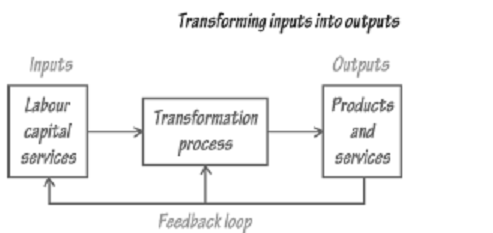Transforming Inputs into Outputs - Productivity Measures
As will become clearer during the course of this chapter, a more quantitative definition of productivity cannot easily be given, since both the measures of achievement and the objectives of the organisation will have a major impact on the way and means by which productivity is measured. For these reasons, the definition of productivity used throughout will be output(s)/ input(s). This is illustrated as a systems diagram in the following figure.

To the politician productivity means money to spend on roads and hospitals; to the economist it is a comparative measure of the health, vitality and competitive strength of an economy; to an operations manager it is a comparative measure of improvement. Productivity is important to everyone. We should constantly seek increases, so that the economy of the nation will continually produce an improving standard of living for all citizens. The increase in gross national product in the US has increased around 1.7 per cent per annum for the past 10 years. For some Asian economies the increase was as high as 5 per cent. The productivity increase of 1.7 per cent according to Heizer and Render (2001) was due to a mix of inputs which contributed the following proportions:
- Capital contributed 38 per cent of the 1.7 per cent growth in the economy
- Direct labour contributed 10 per cent of the 1.7 per cent growth in the economy
- Management contributed 52 per cent of the 1.7 per cent growth in the economy
Measuring productivity is an effective way of determining a country's ability to improve living standards. Also, increasing productivity is the only way that labour and capital can achieve greater financial benefits. Productivity is a significant issue for all societies and one which operations managers must address.
Despite varying individual perceptions of the concept, by the end of this chapter there should be little doubt in your mind that productivity is a critical issue to all not only within organisations but also nations, and that efficient operations can play a large role in the improvement of productivity.
The major constituents are further broken down:
- Capital: level of capital investment and cost of capital
- Labour: basic education and skills; diet and motivation; labour availability
- Management: education and supply
From this breakdown it is clear that management makes a very significant contribution to a nation's GDP. The factors of greatest significance are education and supply. In a knowledge society change is brought about by people who are well educated and motivated who are given the opportunity to bring about improvements in their society. This analysis suggests that if countries wish to lever their productivity, then the education and training of management is their prime goal closely followed by the availability of capital and a conducive environment.